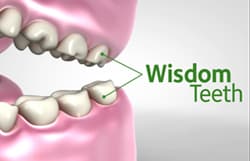- Should Your Wisdom Teeth Be Removed? And Other Common Questions
- Why are they called wisdom teeth?
- Do wisdom teeth need to be removed?
Wisdom teeth are your third molars and typically don’t come in until you are 17-21 years old. Compared to
the average age when the rest of our adult teeth come in (6-7 years old), that’s a lot of extra time for these
molars (and our wisdom and experience) to develop!
However, with time comes the increased chance of complication, as many wisdom teeth struggle finding
room to grow in the mouth. That’s why wisdom teeth removal is so common.
But do you really need to have your wisdom teeth removed? What happens if you don’t? And what is the
procedure like, anyway?
we’ll review some of the common questions patients typically ask about wisdom teeth. Plus, learn how the
doctors and team at Cedar Village Dentistry can help you or your child with their wisdom teeth journey.

- Your third molars are called “wisdom teeth” because they typically come in at an older age when you have more knowledge and experience under your belt.
- Does everyone get wisdom teeth?
- Some scientists believe over time more and more people will evolve to no longer get wisdom teeth. Why? Because, kind of like the appendix, wisdom teeth don’t really serve a valuable purpose to the body.
- However, it’s important to note that just because you don’t see or feel wisdom teeth coming in, doesn’t mean they aren’t there. Many wisdom teeth lurk below the surface of the gums and can cause a slew of dental problems if left unnoticed.
- That’s why we recommend coming in for regular 6-month dental check ups. Our team will examine your mouth and review x-rays to determine the status of your wisdom teeth and the best next steps.

It depends. Wisdom teeth present an interesting challenge to the modern day mouth. You see, the human jaw has grown
smaller over time, leaving less room for the wisdom teeth molars to grow in. These third molars often struggle to fit as
they try to erupt through your gums, and will sometimes grow sideways.
When wisdom teeth are unable to grow normally, they can become impacted. An impacted wisdom tooth is one that
doesn’t erupt above the gums, and instead remains trapped in the jaw. Impacted wisdom teeth can cause pain, tooth
damage, and an increased chance of other dental problems, like decay or infection.
A few of the other problems wisdom teeth can cause:
Crowding or damaging neighboring teeth
Causing teeth to shift and become crooked
Increased risk of cavities and infection, as bacteria has more places to develop
Increased risk of gum disease if the wisdom teeth never erupt through the gums
Jaw pain
Cysts occurring near the wisdom tooth that may damage the roots of nearby teeth
Avoid the dangers of gum disease with holistic dental care in ANBU DENTAL
Seeing all these problems at once, it makes sense why dentists usually recommend removing wisdom teeth, right?
But sometimes wisdom teeth grow in without causing any problems. When that’s the case, as long as you can keep
them clean, they probably don’t need to be removed.
It’s important to talk with your dentist about wisdom teeth.
Our dentists can tell you any potential risks and create a customized wisdom teeth plan just for you.
Our compassionate team at ANBU DENTAL will be happy to guide you through the process and answer
any other questions you might have about wisdom teeth


